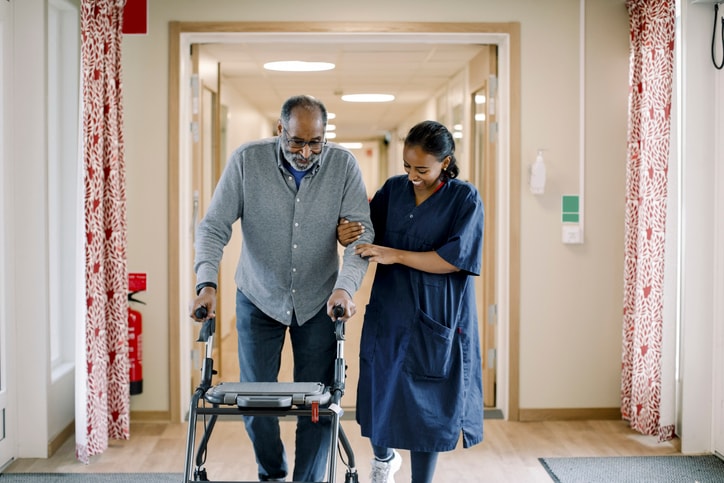Learn about tailored Assisted Living plans for elderly residents.
Learn about tailored Assisted Living plans for elderly residents.
Blog Article
Just How Assisted Living Facilities Enhance Top Quality of Life for Those With Mental deterioration
Assisted living centers play an essential function in improving the lifestyle for people with mental deterioration by executing tailored treatment methods that satisfy their unique demands. These environments integrate organized activities with emotional assistance, cultivating a sense of area while making sure safety and self-reliance. The integration of appealing programs and family members participation better improves the residents' experience. The complexities of mental deterioration care continue to progress, triggering a more detailed assessment of how these facilities adapt and introduce to satisfy the obstacles faced by citizens and their households. What implications does this have for future care versions?
Personalized Treatment Plans
(Dementia Care Charlotte)In a lot of cases, people with mental deterioration require customized support that addresses their one-of-a-kind demands and choices. Personalized care strategies are necessary in assisted living settings, as they make sure that each resident gets appropriate interest and services. These plans are developed collaboratively, including healthcare experts, caretakers, and relative to create a thorough review of the individual's medical history, cognitive abilities, and personal rate of interests.
A well-structured personalized care plan typically includes specific goals connected to health and wellness administration, everyday activities, and social involvement. It represents the person's cognitive decline while promoting independence and self-respect. Normal assessments and updates to the treatment strategy are vital, as they permit alterations based on the citizen's evolving problem and preferences.
Secret components of these strategies often include medicine administration, behavioral assistance approaches, and nutritional guidelines tailored to the person's demands (Memory Care). By concentrating on personalized care, assisted living facilities can foster a supportive environment that boosts the quality of life for people with dementia, ultimately adding to their general wellness and joy. This customized approach respects the originality of each homeowner, guaranteeing they receive the caring care they call for

Involving Activities and Programs
Involving residents in purposeful tasks and programs is essential for enhancing the lifestyle for individuals with mental deterioration. These tasks not only supply enjoyment but additionally stimulate cognitive function and promote social interaction, which can alleviate sensations of isolation usually experienced by residents.

Additionally, individualized programs are essential in guaranteeing that each resident's special choices and capabilities are acknowledged. This tailored technique motivates engagement, improves self-worth, and provides a feeling of success.
Additionally, regular assessments of residents' passions can aid personnel customize and adjust activities to far better match progressing requirements. By prioritizing engaging activities and programs, aided living facilities can dramatically improve the total experience and emotional wellness of individuals living with mental deterioration.
Safe and Encouraging Atmosphere
Developing a secure and helpful setting is important for individuals with mental deterioration, as it directly influences their wellness and lifestyle. Aided living facilities are created with certain features that advertise safety while fostering a feeling of safety and convenience. These atmospheres focus on ease of access, with layouts that minimize confusion and motivate self-reliance, enabling residents to browse their surroundings much more easily.
Precaution, such as protected entryways and exits, protect against wandering and unapproved accessibility, which are critical factors to consider for individuals with mental deterioration (Memory Care). Employee are trained to identify the special requirements of citizens, offering tailored assistance and guidance to ensure their safety. Furthermore, the unification of calming colors and acquainted objects can help minimize anxiousness and disorientation, developing a much more calming atmosphere.
Along with physical safety, emotional support is extremely important. Facilities often utilize team who are not just proficient in caregiving yet also educated in compassion and communication, cultivating trust and relationship with locals. This holistic technique contributes to a caring setting where people really feel valued and comprehended, ultimately boosting their general lifestyle.
Social Interaction and Community
A helpful setting not only focuses on safety but likewise cultivates possibilities for social communication and community interaction, which are crucial for individuals with mental deterioration. In assisted living centers, organized activities and common rooms urge residents to get in touch with each other, reducing sensations of seclusion frequently experienced by those with cognitive problems.
Social interaction plays a considerable function in improving emotional health and cognitive function (Memory Care). Involving with peers in team tasks such as video games, arts and crafts, or exercise not only boosts cognitive abilities however likewise nurtures a feeling of belonging. Facilities often organize occasions that advertise socialization, allowing residents to construct partnerships and share experiences, which can be particularly beneficial for those with dementia
Moreover, a dynamic area atmosphere can enhance the overall high quality of life for citizens. Team members are educated to promote communications and assistance homeowners in forming purposeful connections.
Family Members Involvement and Support
Household involvement is critical in sustaining people with dementia in assisted living atmospheres. Actively engaging family participants not only supplies psychological comfort to residents yet likewise fosters a sense of belonging and connection in their lives. When family members take part in care preparation and day-to-day activities, they add valuable understandings concerning the person's preferences, history, and requires, which can improve individualized treatment.
Moreover, routine household sees can substantially improve the emotional health of homeowners, reducing sensations of isolation and stress and anxiety. Member of the family can also assist in preserving cognitive feature by involving their loved ones in acquainted discussions and tasks. This interaction enhances individual identification and helps locals feel valued and recognized.

Final Thought
To conclude, helped living find out here centers considerably improve the quality of life for people with mental deterioration via customized care plans, engaging tasks, and a safe environment. These components foster cognitive excitement, emotional well-being, and a sense of freedom. Furthermore, normal social communications and solid family members involvement add to meaningful links and psychological support. Collectively, these elements develop a holistic strategy to care that addresses the one-of-a-kind requirements of individuals with dementia, advertising general health and dignity.
Report this page